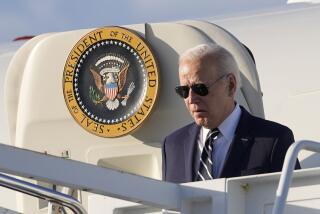White House team visits Mideast to advance its still-secret Israeli-Palestinian peace plan

President Trump’s two top Middle East advisors have quietly crisscrossed the region all week, stopping in five countries in an effort to drum up support for their still-secret proposal to help resolve the Israeli-Palestinian conflict.
Details of the plan that Jared Kushner, Trump’s son-in-law and senior advisor, and Jason Greenblatt, the special envoy for the Mideast, are shopping around have not been publicly disclosed except for broad outlines. It is likely to focus on what are called interim issues, such as security and the economy, and not on “aspirational” issues like Palestinian statehood.
It’s unclear what progress, if any, Kushner and Greenblatt made in seeking to resolve the broader dispute. The White House issued brief, near-identical statements after their stops in Jordan, Egypt, Saudi Arabia, Qatar and Israel. The State Department, normally the clearinghouse for diplomatic endeavors, was silent.
Since Trump already has recognized the disputed holy city of Jerusalem as Israel’s capital, siding with Israel on its status, the Palestinian Authority is unlikely to accept any plan put forward by the White House. Indeed, the Trump administration team was not scheduled to meet any Palestinians on the trip.
The Palestinian Authority has refused to meet U.S. envoys since Trump announced his decision on Jerusalem on Dec. 6, and later ordered the U.S. Embassy moved there from Tel Aviv. It’s unclear how a peace plan could succeed without Palestinian buy-in.
Kushner and Greenblatt arrived in Jerusalem on Friday, their last stop on the trip, and met for four hours with Israeli Prime Minister Benjamin Netanyahu. The U.S. ambassador to Israel, David Friedman, and Israel’s ambassador in Washington, Ron Dermer, attended the meeting.
The group discussed “the continued commitment of the Trump Administration and Israel to advance peace between the Israelis and the Palestinians” and the “means by which the humanitarian situation in Gaza can be alleviated,” the White House said in a statement Friday. The Americans were due to hold other talks Saturday before returning to Washington.
Trump has broken with previous presidents by offering support for the Israeli settler movement — the building of Jewish enclaves on land claimed by the Palestinians, a process that most of the world considers illegal. Trump also has refused to explicitly endorse the conventional proposal for a two-state solution that recognizes an independent Palestinian state next to Israel.
The current proposal would probably expand some of the area controlled by the Palestinian Authority but without ensuring a contiguous territory, several experts said. It has long been an insurmountable sticking point, in the Palestinian view, that Jewish settlements built by Israel in the West Bank and East Jerusalem bisect what would become an independent Palestinian state.
Any plan also is likely to provide for indefinite Israeli control of airspace and a section of the Jordan River valley on the eastern border of Israel and the West Bank as a security measure. The Palestinians consider that control a violation of any sovereignty they may gain.
The talks this week also focused on the besieged Gaza Strip, the narrow band of land on the Mediterranean Sea where nearly 2 million Palestinians live in poverty.
The Trump administration has slashed the U.S. contribution to the United Nations agency that provides aid to Palestinians, especially those in Gaza. The shortfall is forcing the U.N. Relief and Works Agency to make a global emergency appeal next week.
The long-term status of Jerusalem is not likely to be solved or even tackled in any Kushner-Greenblatt deal. There have been suggestions that it would give several eastern Jerusalem neighborhoods, including suburbs, to the Palestinians, but not any part of the heart of the holy city.
The White House has sought to tamp down reports that the plan is heavily pro-Israeli or that it will seek to divide Gaza from the West Bank.
The Trump administration is hoping to count on support from friendly Sunni Muslim majority Persian Gulf states like Saudi Arabia and the United Arab Emirates to gain influence with the Palestinians. Egypt and Jordan are the only Arab countries to have formal diplomatic relations with Israel.
Kushner and Greenblatt reportedly lobbied the Gulf potentates to invest up to a billion dollars in energy and infrastructure projects for Gaza, which is ruled by the militant Islamist group Hamas and suffers from a lack of potable water and electricity.
The Saudis and other Gulf rulers are close to Trump, but the Palestinian issue is politically complicated for them. Any plan seen as a betrayal of Palestinian aspirations is likely to trigger protests in those countries, especially by their large Palestinian populations.
That is keenly true for neighboring Jordan. King Abdullah II, who met with Kushner and Greenblatt on Tuesday in the capital, Amman, will visit Trump at the White House on Monday to weigh in personally with the president.
In its talks with regional leaders, the Trump administration most of all is attempting to scale back expectations of the “ultimate deal” that Trump last year said he hoped he could do to resolve the long-running crisis. Trump’s critics say that’s long overdue.
“The United States is not a credible mediator in this: They can’t even talk to one of the parties,” said Ilan Goldenberg, a Middle East expert at the Center for a New American Security in Washington, and an advisor to the Israel Policy Forum, a nonpartisan organization that works with former Israeli security officials who support a two-state solution.
“I’m not sure Trump can ever do it,” Goldenberg added.
Daniel Shapiro, who served as U.S. ambassador to Israel under President Obama, echoed the dim outlook and noted another problem — the deep-seated mistrust between Netanyahu and Palestinian Authority President Mahmoud Abbas.
“If, somehow, by hook or by crook, Trump managed to drag them back to the negotiating table, it would almost certainly fail spectacularly, likely punctuated by another round of violence,” Shapiro said in an 18-point Twitter thread.
“No one ever advanced a peace plan ahead of negotiating,” said Aaron David Miller, a veteran Middle East peace mediator in Republican and Democratic administrations who is now at the nonpartisan Wilson Center in Washington.
Kushner and Greenblatt were expected to discuss an international trust fund that the United Nations wants to set up to support Gaza, without having to go though Israel or Hamas, said Dennis Ross, another former negotiator.
When diplomats like Ross and Miller dedicated their time to building peace, they did so under the auspices of the State Department, which is not happening in this administration.
Secretary of State Mike Pompeo “supports this trip, supports this travel,” State Department spokeswoman Heather Nauert said when asked about the envoys’ Mideast efforts. Pompeo, she added, “is having ongoing conversations both with Mr. Kushner and Mr. Greenblatt, and looks forward to getting a readout when they return.”
Special correspondents Hana Salah in Gaza City and Noga Tarnopolsky in Jerusalem contributed to this report.
For more on international affairs, follow @TracyKWilkinson on Twitter
More to Read
Start your day right
Sign up for Essential California for news, features and recommendations from the L.A. Times and beyond in your inbox six days a week.
You may occasionally receive promotional content from the Los Angeles Times.







